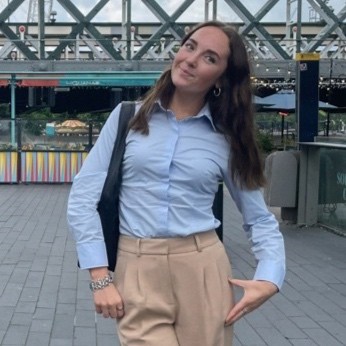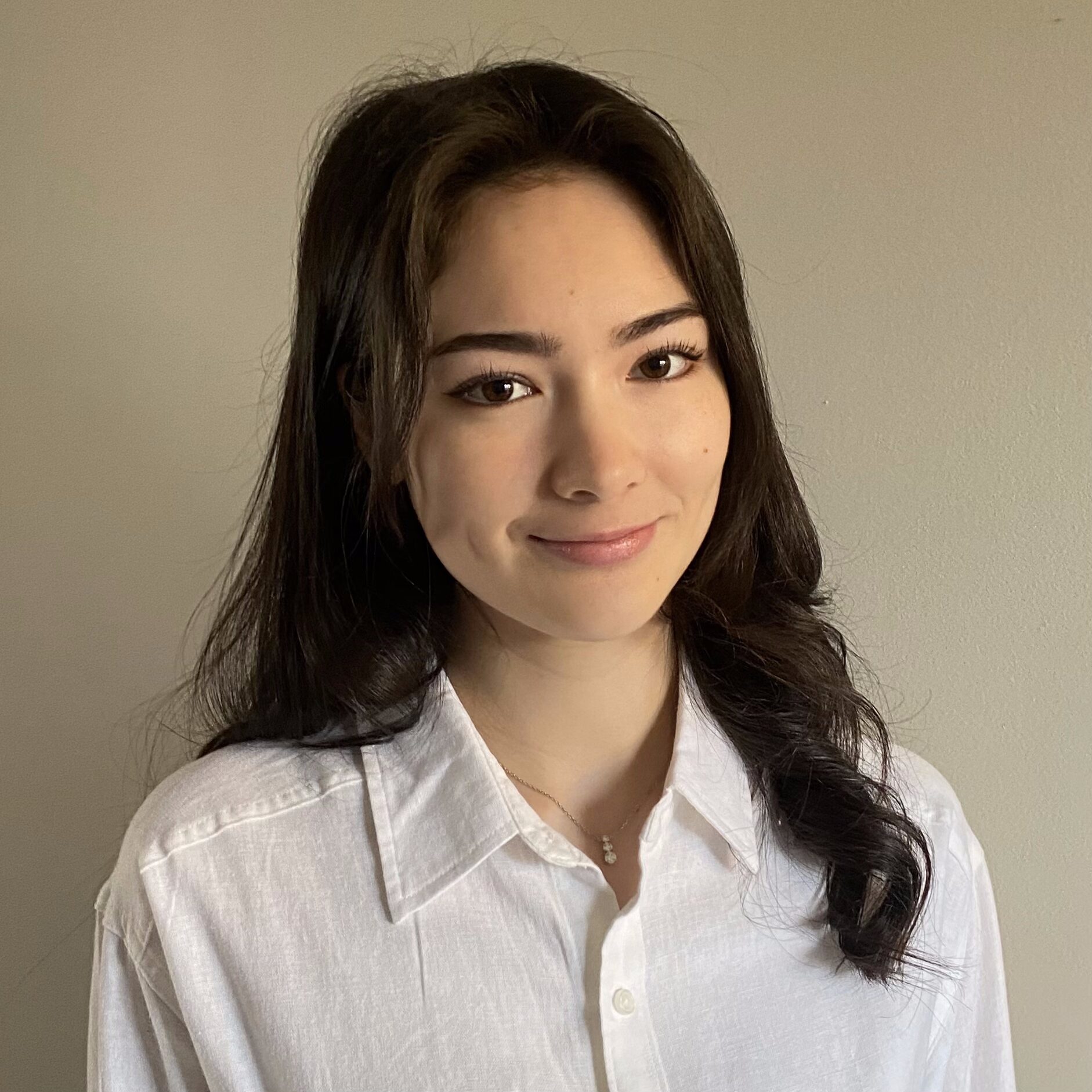“Encouraging the next generation to participate in the political system and affect positive change in society is vital for a healthy democracy. Patchwork Foundation is creating a space to make politics more accessible, and I credit you for the exemplary impact you are having.”
Leonie has completed a master’s degree in Security, Leadership and Society focusing on Africa and other emerging economies. Recently, she has founded an organisation called ATOC that aims to change the way in which inclusivity is approached by businesses, hoping to centre the lived experiences of Black and ethnic minority employees. She writes for her own blog and for other publications, focusing on current affairs, race and gender. Previously she studied International Politics and Security Studies at Sheffield University, where she developed in-depth analytical skills. Leonie graduated from the Patchwork Masterclass in 2018.
First of all, you’ve spent most of 2020 and the pandemic in Ghana. Has it been interesting comparing the politics in Britain and Ghana?
African politics in general is so complicated because of colonization. They have a lot of external influences; we have a bit of American pressure and then we have remnants of British influence and then we just borrowed something from Germany – it’s just a lot.
But on the whole the Government has been more concise with their Covid messaging than the British government. So for example, they completely closed the borders in March and masks were immediately mandatory. We did kind of have a short lockdown in the main cities, but we don’t have the infrastructure to facilitate remote working and the Government realized they couldn’t provide for people in terms of food and water to sustain them. More people may have died of hunger.
We’re now almost back to normal. Lots of people thought that ‘Africa has no health infrastructure’ so we were going to be hit really badly, but the fact is we’ve dealt with more epidemic and health emergencies. It’s also a young population, there’s the heat, and our food has the essential minerals and vitamins.
But we still have fatigue because we’ve had health emergencies which have caused even more deaths than Covid. There was a meningitis outbreak around the same time, and people were wondering why the government didn’t have the same reaction to that outbreak.
Why did you join Patchwork, and what did you gain from it?
I was always super interested in politics, but when I studied it at university I was much more interested in different countries’ systems. So, when I saw that there was an opportunity to actually learn about grassroots British politics and really get involved in how politics works, not on an ideological or theoretical level but on a practical one, it sounded fun!
I think what I gained from it was a greater appreciation for the work that politicians do, and seeing politicians face to face humanizes them a bit. It also gave me an insight into how politics has changed – I feel like politics used to be calmer! Now it just seems like things that people would have lost their seats over before, people now completely ignore. Seeing that evolution of politics has been interesting.
But I’m always most keen on the horizontal relationships. As much as I like hearing from the Speakers, I love getting to know the people I get to do these things with. In Patchwork I found a group of people who were interested in politics! I’m so used to being the only one! Even just being around a group of people who get it is enough for me.
Going to the Party Conferences was also wild – definitely a highlight!
You’ve been accepted onto this year’s Patchwork International Visitor’s Programme with the US Embassy.* How have you found the Programme so far, especially given the upcoming election?
*Due to the Covid-19 Pandemic, the in-person trip to the US has been postponed, with virtual sessions on American politics taking place in the meantime.
We’ve just finished the digital portion of the Programme which was really interesting! We got to learn about the American side of things. I knew a tiny bit about American politics, but I’d never looked at the hyper-localised stuff which was really interesting to learn about, like municipalities and districts. It’s conveyed that a lot of people are apathetic about politics but it seems like on a local level there is a lot of engagement.
In terms of the in-person portion of the session, like in the Masterclass Programme I’m looking forward to the horizontal relationships. This is a group of people who have been selected because they’re amazing, and I’m just thinking ‘I need to know you now, we need to be best friends because you’re going places in this life and I want to be there’.
In terms of the election, I don’t want people to take Joe Biden’s win (if he wins) as an ‘okay we’re done now, let’s go back to not caring’.
Because I’m in Ghana, the way I now interact with European and American politics has changed. When I was in the UK, it was very much consuming, but now it’s more about ‘is your foreign policy going to change?’ Sometimes the foreign policy remains constant no matter who is at the helm.
You’re also part of the Ubele Initiative. Can you tell me a bit more about what you do with them?*
*The Ubele Initiative is a social enterprise committed to the sustainability and wellbeing of the African Diaspora community.
I’m part of their Young Emerging Leaders Collective. They want to add a younger or youth element to the initiative because right now it’s very much led by older people who have been activists and campaigners for decades, and some of them are tired. They realized they need some young people to continue the work they’re doing.
I recently held a workshop for Black History Month, first for young people for the British Youth Council and then for Ubele’s networks. That was really good – I focused on unknown parts of British history like the Bristol Bus Boycott, the Nottingham riots of 1958, as well as some of the activist and campaigners we’ve had such as Olive Morris and Darcus Howe. I just wanted people to reflect on the fact that the issues that we’re having are not new.
The other part of the workshop was about reflecting on their own journeys and why they want to make a change. I think the one with the younger people with the British Youth Council was really interesting because a lot of them had witnessed horrific acts of violence among and towards ethnic minority communities, and they were 15 and 16 and going ‘this is not okay, I want to make a change’.
How do you think Black History Month went this year, given the combination of protests and pandemic?
This Black History Month felt weird. A lot of it felt rushed and performative. I was just thinking ‘guys you’ve had months to prepare, you were posting black boxes in June’. And people are still asking for free labour! Payment is the bare minimum you can do – pay me for my time!
I don’t want to say I’m over Black History Month but I now get what the older people at Ubele are talking about in that it just feels like the same thing every time. It’s hard not to get demotivated because they were fighting for equality in the 1980s, and now it’s 2020 and we’re still having to fight against stop-and-search and discrimination in the workplace.
I’m waiting to see what November brings, because people have a tendency to be suddenly willing to listen in October, and then stop in November. I’ve seen how interest dwindles after the month ends. Instead of it being a starting point, people see it as an end point.
You’ve started a business with fellow Patchworker Barbara. Can you expand on that?
It’s called A Touch of Colour, which is like Glass Door but for inclusion. We want to ask people of colour to anonymously rate their companies on how inclusive their workplace is. Once we have enough data we’ll start rating the companies.
We realized employers thought having representation was enough, but it’s important to ask ‘are people of all backgrounds prospering?’ There’s also a lot of emphasis on senior and entry level representation, and no one looks at the pipeline; are people being promoted, how long are they there, is there a high turnover rate?
We’re trying to give insights to people of colour about the companies they’re going to work for, but also trying to help companies realise they have to go beyond ‘we have this many ‘diverse’ employees’ and start asking ‘yes but are they happy and thriving?’.
We’ve also made it very clear we want to break up the ethnicities. It’s not useful having ‘BAME’ or ‘people of colour’ statistics because everyone’s experience is different.
Last but not least, what piece of advice would you give to people thinking of joining Patchwork, and to young people more broadly?
In terms of joining Patchwork, obviously just do it. The amount of opportunities I’ve had with Patchwork has been insane!
But you need to have a mindset to commit. Sometimes you don’t know what you’re getting yourself into, but if you’re not excited about it or if you’re not willing to commit then you’re not going to get as much as you can get from it, and people won’t remember to mention your name in room when you’re not there.
It’s harder when it’s virtual, but you are still able to make an impact online, and I think that’s what this time has shown. Everyone is at home, but campaigns have been built virtually, groups have been sustained virtually, protests have been organized virtually. It’s really been an eye opener, and I’m grateful I’ve been able to continue doing what I do even though I’m in Ghana; I’ve still been able to host sessions online and talk about anti-racism work even though I’m on a different continent. The faster you adapt the better it will be for you.
A Touch of Colour, known as ATOC, was born out of a need to genuinely centre the experiences of employees of colour. ATOC aims to create a platform that captures qualitative data on inclusivity at the workplace through anonymous reviews. Using this data, we hope to rate companies on how inclusive they are in turn informing potential as well as providing concrete data for HR professionals who wish to better their ATOC rating.
Help ATOC gather the data it needs by anonymously adding your own experiences here: www.atocltd.com
Stay updated
Join our mailing list to stay up to date with all the latest!


